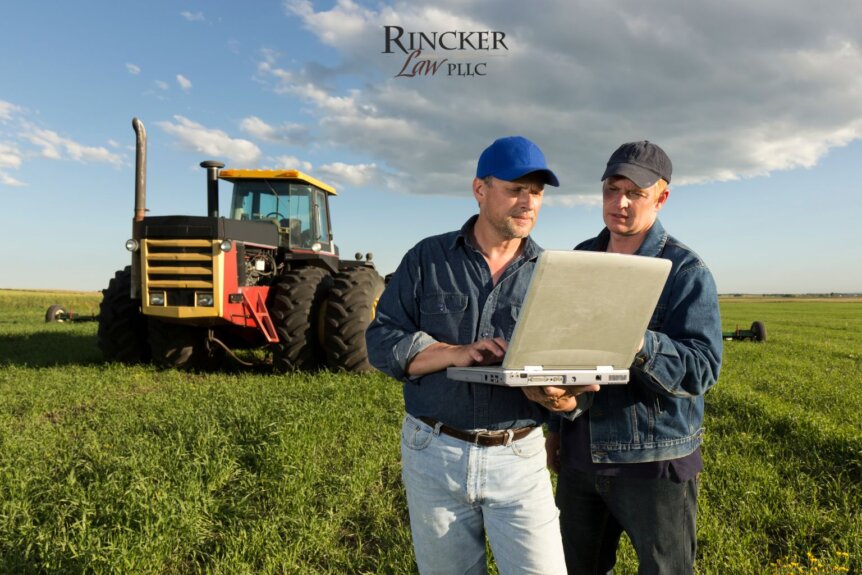For many Illinois farmers, equipment is one of the largest and most important investments they make. Whether you’re purchasing a new tractor, leasing harvesters, or upgrading irrigation systems, these deals often involve significant financial commitments. In this article, Buying or Leasing Farm Equipment in Illinois: Legal Tips for Protecting Your Investment, we share key legal and financial considerations to help you make smart, secure decisions for your operation.
Step 1: Decide Whether Buying or Leasing Makes More Sense
Buying
- Pros: You own the equipment outright, can build equity, and may be able to depreciate the asset for tax purposes.
- Cons: Higher upfront cost, long-term maintenance responsibilities, and the risk of obsolescence as technology changes.
Leasing
- Pros: Lower upfront costs, flexibility to upgrade at the end of the lease, potential tax deductions for lease payments.
- Cons: No ownership at the end of the term, possible usage restrictions, and penalties for early termination or excess wear.
Tip: Discuss both options with your tax advisor—Illinois farmers may benefit from different depreciation schedules or lease structures depending on their operation size and revenue.
Step 2: Understand the Contract Terms Before You Sign
Whether buying or leasing, your agreement should clearly outline:
- Purchase Price or Lease Payment Amount – Include any interest or finance charges.
- Payment Schedule – Monthly, seasonal, or annual payments; due dates and grace periods.
- Delivery and Installation – Who is responsible for delivery costs and setup.
- Warranty Coverage – What’s included, how long coverage lasts, and who provides repairs.
- Maintenance Obligations – Your responsibility versus the dealer’s.
- Early Termination Rules – Penalties or buyout options if you end the lease early.
For leases: Confirm what happens at the end of the lease, do you have a purchase option and at what price?
Step 3: Protect Yourself With Written Agreements
Verbal agreements may be common in farming communities, but they leave you exposed if something goes wrong. Always insist on a written contract, and keep copies of:
- Sales receipts and financing agreements
- Warranty documentation
- Service and maintenance records
- Any amendments to the lease or purchase agreement
Step 4: Consider Financing and Security Interests
If you finance equipment through a dealer or lender, they may file a UCC-1 financing statement to secure their interest. This is normal, but you should:
- Understand when the lien will be released (usually when the loan is paid in full).
- Make sure the financing statement only covers the intended equipment, not other farm assets.
- Confirm payoff amounts before finalizing any early loan repayments.
Step 5: Check for Title and Ownership Issues
For used equipment purchases:
- Verify that the seller actually owns the equipment free and clear.
- Ensure there are no existing liens—these can transfer to you as the new owner.
- Get the serial number and cross-check with lien search databases.
Step 6: Factor in Illinois Sales Tax and Agricultural Exemptions
Illinois offers certain sales tax exemptions for qualifying agricultural equipment purchases. To benefit:
- The equipment must be used primarily for farming.
- You’ll need to provide the seller with an Agricultural Machinery and Equipment Sales Tax Exemption Certificate.
- Keep detailed records in case of a Department of Revenue audit.
Step 7: Protect Against Equipment Downtime
Even the best equipment can break down unexpectedly. Consider:
- Extended warranties or service agreements.
- Insurance coverage for theft, damage, or loss.
- Backup equipment arrangements for peak harvest or planting seasons.
FAQs: Buying or Leasing Farm Equipment in Illinois
Q: Is it better to lease or buy farm equipment in Illinois?
A: It depends on your cash flow, tax strategy, and how often you need to upgrade. Buying builds equity; leasing offers flexibility and lower upfront costs.
Q: Can I get out of a farm equipment lease early?
A: Possibly, but early termination often comes with penalties. Review your contract for specific terms before signing.
Q: How do I know if a used tractor has a lien?
A: Run a lien search using the equipment’s serial number through the Illinois Secretary of State’s UCC database.
Q: Do all equipment purchases qualify for Illinois farm sales tax exemptions?
A: No. The exemption applies only to qualifying machinery and equipment used primarily in farming operations.
Q: Should I get legal review before signing an equipment contract?
A: Yes—especially for high-value purchases or complex leases. An agricultural attorney can help ensure the terms protect your interests.
Need Legal Assistance Buying or Selling Farm Equipment in Illinois?
Farm equipment purchases and leases are major investments that can impact your finances, operations, and future planning. By understanding your options, reviewing contracts carefully, and taking advantage of Illinois-specific exemptions, you can protect your investment and keep your farm running smoothly.
At Rincker Law PLLC, we help Illinois farmers negotiate and review equipment contracts, secure financing, and protect their operations from legal pitfalls.
Call us today at (217) 774-1373 to get guidance on your next farm equipment purchase or lease.

